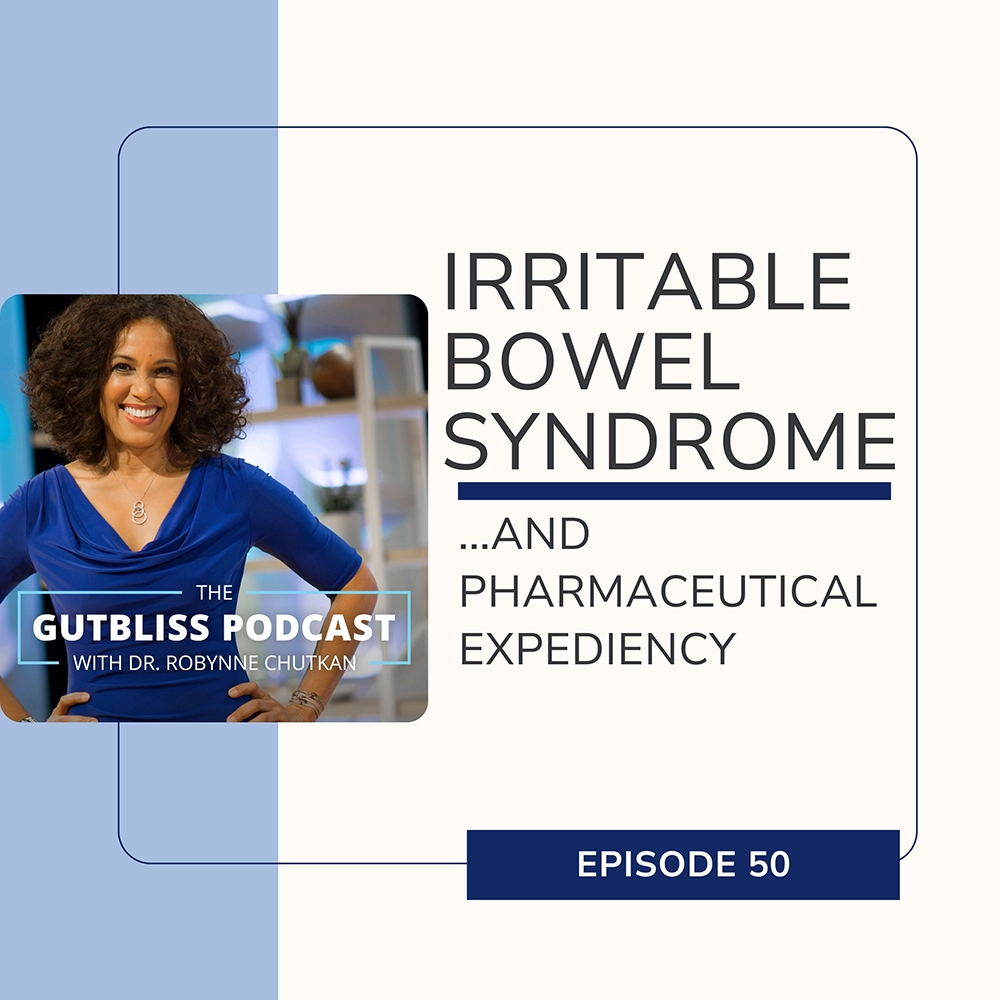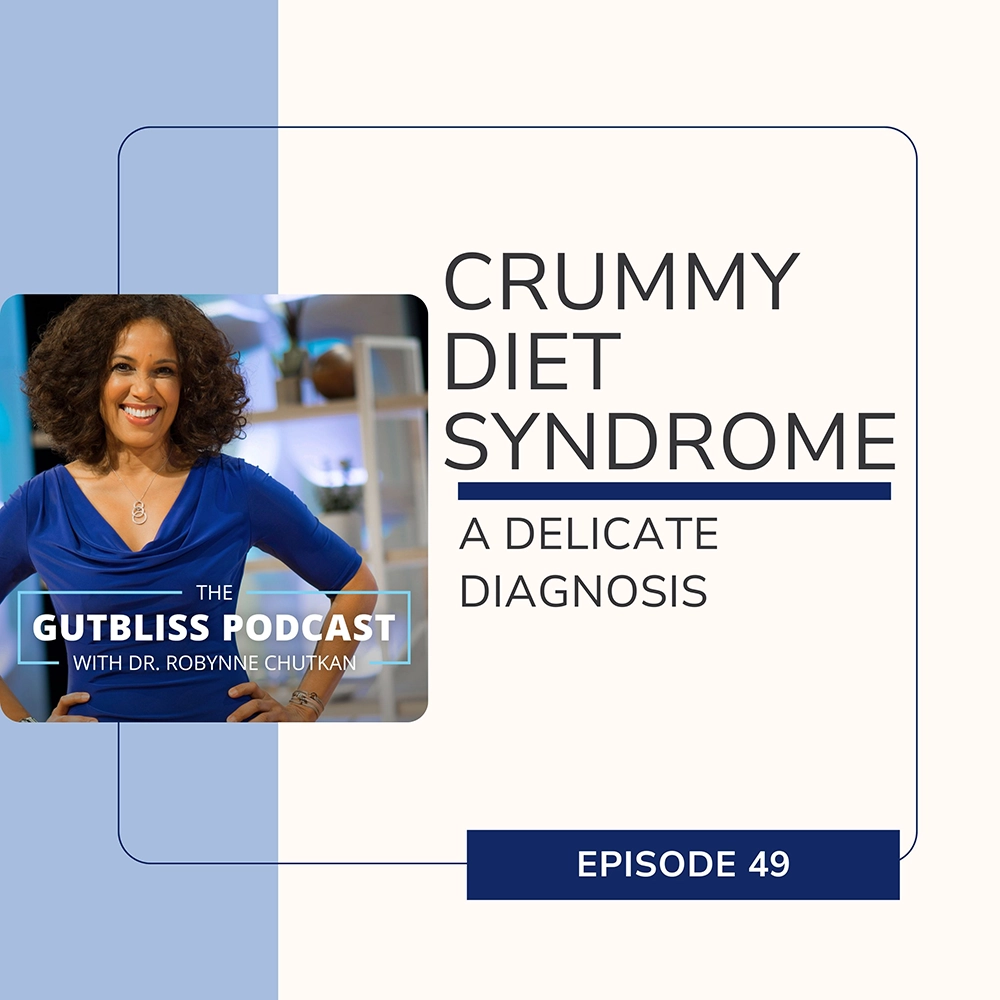IBS is frequently referred to as a diagnosis of exclusion: your doctor can’t find anything else wrong; therefore, it must be IBS. But if you slice up the IBS pie and take a good look, you actually find lots of potential explanations for what might be causing your symptoms. In this episode I go through over 30 different causes of IBS symptoms. These are conditions that we see frequently in a gastroenterology practice that should definitely be on the list when somebody is complaining of abdominal pain or a change in their bowel habits. But in order to correctly diagnose these conditions, you have to be thinking beyond an umbrella diagnosis of “IBS”. You have to actually be interested in finding out what is causing the symptoms.
Thank you for being a part of our community! For the latest in digestive wellness go to https://gutbliss.com/ and follow us on Instagram for more gut health info.
In last week’s episode I talked about the pharmaceutical expediency of diagnosing as many people as possible with IBS – and putting them on prescription drugs. Almost all IBS research is funded by the pharmaceutical industry. That doesn’t automatically mean it’s bad research, but it makes it a lot harder to tell if it’s good research. The Washington Post reported that “as the drug industry’s influence over research grows, so does the potential for bias,” and a study from the University of Pennsylvania found that the odds of research coming to a favorable conclusion for a drug are almost 4 times greater when that research is funded by the company making the drug.
Here’s the problem with that pharmaceutical approach: Serotonin in the gut has been the subject of intense pharmaceutical science. Companies have spent millions of dollars on research and millions more promoting drugs for IBS that reduce gut motility by blocking serotonin, and others that increase motility by increasing serotonin. And those drugs do indeed do what they’re supposed to do. And sometimes they’re helpful – although in my experience they almost never completely resolve IBS symptoms, and because of their side effects, they’re not well tolerated. But even when a serotonin-blocking or promoting drug is helpful, it still doesn’t explain why you have abdominal pain, diarrhea or constipation in the first place. It’s treating a symptom, not the cause.
IBS is frequently referred to as a diagnosis of exclusion: your doctor can’t find anything else wrong; therefore, it must be IBS. But if you slice up the IBS pie and take a good look, you actually find lots of potential explanations for what might be causing your symptoms. When we come back…. why is your bowel irritable?
I’m going to go through a list of 3 dozen different causes of IBS symptoms that I myself have seen or diagnosed in patients who came to see me who had previously been given a diagnosis of IBS. Some of them are super common – like constipation and gluten sensitivity, but what I want to emphasize is that none of these are rare, unusual diagnoses. These are conditions that we see frequently in a gastroenterology practice. Some are conditions that an OBGYN would typically diagnose, like uterine fibroids or endometriosis. The point here is that these are diagnoses that should be on the list when somebody is complaining of abdominal pain or a change in their bowel habits. But in order to correctly diagnose these conditions, you have to be thinking beyond an umbrella diagnosis of “IBS”. You have to actually be interested in finding out what is causing this person’s symptoms. And of course, it’s always more expedient to simply say “you have IBS” and write a prescription and be done. OK, here’s the list:
1. Aerophagia (air swallowing)
2. Antibiotic use
3. Bile acid malabsorption
4. Bile gastritis
5. Carbohydrate malabsorption
6. Celiac disease
7. Constipation
8. Crohn’s disease
9. Diet
10. Diverticulosis
11. Dysbiosis
12. Eating disorders
13. Endometriosis
14. Eosinophilic gastroenteritis
15. Fibroids
16. Food allergies
17. Fructose malabsorption
18. Gallbladder dysfunction
19. Gallstones
20. Gastritis
21. Gastroparesis
22. Gluten sensitivity
23. Helicobacter pylori
24. Infections
25. Lactose intolerance
26. Leaky gut syndrome
27. Liver disease
28. Medication side effects
29. Motility disorders
30. Microscopic colitis
31. Ovarian cysts
32. Parasites (especially Giardia and Blastocystis hominis)
33. Small intestinal bacterial overgrowth (SIBO)
34. Stress
35. Thyroid disorders
36. Ulcerative colitis
For every potential cause I just listed, there are probably dozens more we don’t even know about and don’t have the tools to diagnose: viruses, allergies, and autoimmune problems that haven’t even been discovered yet. And there can be multiple things at play—a chronic infection causing food allergies, plus side effects from your antidepressant and a suboptimal diet. So IBS is really a set of symptoms, with multiple different causes that vary a lot from person to person, rather than a definitive disease or diagnosis. It’s sort of like fatigue—not a disease unto itself, but a symptom with hundreds of possible causes, no single test to diagnose it, and no one all-encompassing treatment. If I went to see a doctor because I felt tired, and she told me my diagnosis was fatigue and that the solution was to take pills for the rest of my life to pep me up, I would question her diagnosis and treatment. I’d want to know why I felt tired, what was causing it, and what I could do to resolve or improve it, besides taking medications. When we come back…what can you do to get to the root cause of your IBS symptoms?
With so many different potential causes of IBS symptoms, it can be overwhelming and confusing to figure out where to start. What I recommend is to think in terms of categories and then try to figure out which category your symptoms may fall under, keeping in mind that there may be more than one category at play. Here are the 10 categories that I’m usually thinking about when I see a patient with a diagnosis of IBS:
1. Medicine cabinet – are your symptoms a side effect of a medication you’re taking. Iron and calcium supplements, allergy medications, BP medications, pain relievers are notorious for causing constipation and abdominal pain, while antibiotics, some heartburn medications, NSAIDs, and antidepressants can often lead to diarrhea.
2. Diet – so many things in this category, from food sensitives to gluten, fructose malabsorption, lactose intolerance, constipation from a high-fat low fiber diet – I see this a lot in people who are on a ketogenic or low carb diet, Too much ultra processed foods just making you feel overall crummy. Simple things like not enough water. That is causing things to clog in your digestive pipes and leading to bloating and constipation. And I am shocked at the amount of people I see in my office when I take a detailed dietary history who tell me that their doctor has never, ever asked them one single question about their diet.
3. Lifestyle – This would include things like eating a large meal late at night, which can cause bloating and pain because your GI tract is much less active once the sun sets and so the food is just going to sit there in your stomach and make you really uncomfortable. Not getting enough exercise because as I always say: if you’re not moving neither are your bowels! Being sedentary is going to lead to a lot of backup and bloating and discomfort – symptoms that are often just ascribed to IBS without any investigation into your habits.
4. Anatomy – the commonest cause here is what I call “the voluptuous Venus colon” and this is one of my favorite episodes, episode #3. What I’m describing is the fact that women have a longer colon than men; we also have a deeper, wider pelvis and we have lower testosterone levels which lead to an abdominal wall that’s not as tight. All of these factors conspire to create more looping in the female colon, which translates to more bloating and constipation. And that’s a big part of why IBS is so commonly diagnosed in women. But again, so often we are using a pharmaceutical treatment to overcome an anatomical problem that is much more effectively treated with diet and lifestyle adjustments.
5. Physiology – one of the common causes in this category is motility disturbances in the gut which can be a result of several things; can be a result of medication, can be a result of a disrupted microbiome, can be a result of hormonal changes – so this category has several sub categories. People with diabetes – which is an increasingly large percentage of the population – can have physiologic changes in the gut because the diabetes affect the nerves that control the emptying of the GI tract. And so what we see with diabetes is that motility in the gut can either be too fast where the person is having diarrhea, or too slow where they’re severely constipated, or it can affect stomach emptying specifically causing a condition called gastroparesis where the stomach doesn’t empty properly and there’s a lot of nausea and pain and sometimes vomiting. I’ve seen people with diabetes told that they have irritable bowel syndrome when in fact what’s going on is that they’re having GI symptoms because their diabetes and blood sugar is not well controlled.
6. Hormones – hypo-or hyperthyroidism, menopause, perimenopause, menarche. When menstruation first starts, young women often experience GI symptoms at that time and are misdiagnosed as IBS. In menstruating women, we often see fluctuations in GI symptoms at different stages in the cycle based on the fluctuating levels of estrogen and progesterone. And often these women are told they have IBS when really what’s going on is that they’re having hormonal fluctuations each month and this is what’s causing the GI symptoms.
7. Microbiome – Whether we’re dealing with a specific situation of small intestinal bacterial overgrowth or general disruption of the microbiome that we call dysbiosis, this is one of the largest categories. And the treatment should be to figure out why the microbiome is disrupted. If this is an ongoing issue because of a medication that you’re taking, like acid blockers or antibiotics or steroids, then the approach would be to try and stop that medication. If it’s damage from the past, then you need to try and optimize your microbiome through diet and lifestyle, not through taking more antibiotics, which unfortunately is what’s often recommended. And did I mention that my brand new course, “Mastering SIBO” just opened for registration this week? It’s a practical, root-cause approach to managing your symptoms and getting lasting relief from SIBO and you can find it on my website at Gutbliss.com
8. Immune system – another really large category that encompasses autoimmune disease, which is an overactive immune system where your body is reacting to its own tissues and recognizing them as foreign and launching an attack. And we are now up to more than 100 different autoimmune diseases, affecting 1 in 4 Americans. I’m talking about things like celiac disease and Crohn’s disease and ulcerative colitis and MS and lupus and multiple others. And because this immune imbalance often originates in the gut, even if the autoimmune disease itself doesn’t primarily affect the gut, even if it’s affecting the joints or the skin, there are often accompanying GI symptoms. And many times, the physician who is treating your joints or your skin or your kidneys may not recognize that your GI symptoms are also part of the autoimmune disease.
9. Stress/mental health – This can be a standalone category where. The stress is entirely responsible for the symptoms, but more commonly I see this as an exacerbating factor. And go back and check out episode 39: “Stress: In Your Mind & in Your Gut” for a detailed explanation on this.
10. Infectious – I’m talking about things like undiagnosed H pylori infection, or Blastocystis hominis, or Giardia, which can cause chronic loose stools and gas and nausea. And there are lots of different tests out there to diagnose these things, but they’re not all reliable. Some over diagnose, and some underdiagnose, so it’s important to make sure that your specimen is being sent off to a reputable lab so you can be confident about the results. And to further confuse things, keep in mind that just because you’ve been diagnosed with a parasite does not necessarily mean that the parasite is the cause of your symptoms. If this is something that you’re concerned about I want you to go back and listen to episode #20 on Parasites.
OK, that was a lot of information. That was like a mini GI fellowship, but I hope I’ve given you lots of things to think about and some useful tools. If you are struggling with GI symptoms and wondering if you have IBS or have been told you have IBS, you can copy the transcript from this episode, which you can find on my website at gutbliss.com, and you can use it to make a list to ask your doctor about. I want to leave you with three takeaways about slicing up that IBS pie.
1) The reality is that no two patients experience IBS in exactly the same way. What works for your friend may not work for you. Information from magazines and the Internet can be confusing—some web sites tell you to increase soluble fiber; others say soluble fiber will make you worse, I’ve had people tell me about diluted apple cider vinegar cures, crushed papaya seeds and honey, energy healing, Chinese herbs, cod liver oil, FODMAP diets, prescription antispasmodics, probiotics, aloe vera juice, flax seed smoothies, juice cleansing, and dozens of other things that helped their symptoms.
2) Bottom line: what works best for IBS is what works for you. I’m a believer in the Hippocratic principle of primum non nocere (“above all, do no harm”) so I’m generally willing to consider most things as long as the benefit clearly outweighs the risk and there are tangible improvements.
3) If I were to leave you with a final thought, it would be to recommend persistence, patience, and an open mind when it comes to investigating the factors that may be responsible for your IBS symptoms. And in your quest to find the cure, don’t forget to consider solutions that incorporate dietary strategies, lifestyle changes, and mind-body techniques. It’s the ideal place to start if you’re looking for innovative solutions for digestive wellness with no downside. Start with that foundation of healthy living and eating and add from there.
So that’s it for this episode of the Gutbliss podcast on slicing up the IBS pie to find real and lasting relief. I cannot believe that this is the second to last episode of my first season of the Gutbliss Podcast! Thank you to all of you who showed up every week to listen, who sent me comments through the website or through fan mail on Buzzsprout. By the way, not sure that you know – and I probably should have mentioned this earlier, but with fan mail I’m not able to see your email address so I can’t respond to you – even though I love getting your comments. So a better way to be in contact is through my website, or even better, join the Gutbliss GUT CLUB, and we’ll see each other live twice a month and be able to have a meaningful exchange about all your digestive health concerns. You can find more information about that and sign up for a free 30-day trial at Gutbliss.com. Next week will be Episode 52. And I’m thinking of something really special for you for that last episode of season 1. After that I’m going to be taking a break for a few weeks and then coming back with Season 2, which is going to have video. I’m both excited and terrified about that. No more recording in my pajamas. I’m going to have to actually try and muster up a hairstyle and put on some lipstick. But I am as committed as ever to bringing you free science based, clinically relevant gut health information to help you and your loved ones find your gut bliss.









